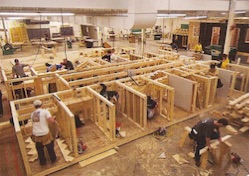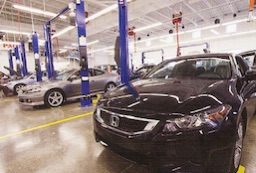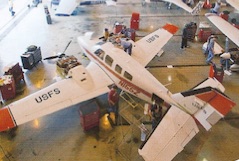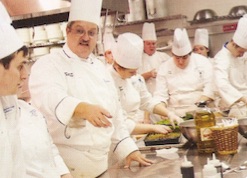This week I continue my series on Degrees That Work—a look at Pennsylvania College of Technology. Take a visual walk with me across the campus and you will see there are labs; and then there are labs.
Anyone who has ever been to high school or college has done lab work related to a class. But as I mentioned previously, Penn College is no ordinary college. What does that mean? The labs on their campus are no ordinary labs. It’s one thing to add a lab to coursework days after the subject is studied. It’s another thing to use the lab for hands-on training and experience immediately after learning about it in the classroom.
Penn College has taken this concept and turned it into a well oiled, rock star training, job securing, life-altering education.
 These labs simulate the working world
These labs simulate the working world
It may be hard to visualize the scope of these on-campus labs, but imagine several mini-worlds all operating under one roof. You have a chef’s kitchen, fully equipped with students taught by professional chefs and a fully staffed restaurant serving their culinary creations. Across the campus you have a construction zone with miniature houses from foundation to roof, with plumbing, electrical, and trim work all being completed by the students. In another facility on campus you have welding cubicles where each student has the opportunity to practice his craft with real-world simulations on pipes and fittings. Walk down a long corridor and you find yourself in a full automotive diagnostic room and automotive bay with actual vehicles and students solving electrical and mechanical problems.
Off campus on separate facilities you can find an aviation hangar with every flying craft imaginable from a helicopter, to a small single engine plane, to a private jet, to a commercial airliner donated by FedEx. A short drive down the road there is a forestry department with actual logging facilities, greenhouses, and several working oil rigs used to train students for the oil industry.
 These labs teach students how to deal with real world problems and issues
These labs teach students how to deal with real world problems and issues
Students are given hands-on experience dealing with and diagnosing problems as their education progresses. By providing students with actual problems, Penn College teaches them to master these problems and find solutions before they enter the workforce. The automotive training requires students disassemble and reassemble a complete engine, diagnosing any problems that might occur upon reassembly. The aviation training gives student actual simulation experiences with warning lights, faulty wires, and instrument malfunctions.
Have you ever wished that the student nurse trying to draw blood had actually practiced on a live human before you? Penn College solved this problem with their SIMM family. Students in their health science program get the opportunity to practice using this SIMM family. These simulations cover everything from live childbirth (I got to experience this!) to caring for the rest of the family. Instructors can simulate illnesses and emergency situations that might arise during a healthcare situation. This SIMM family is like no other in any education training program.
 These labs prepare students to enter the workforce as fully trained employees
These labs prepare students to enter the workforce as fully trained employees
Once students graduate from Penn College they can hit the ground running. It’s not necessary for employers to train them on basic techniques or skills. They are familiar with equipment, tools, practices and techniques used to work at their chosen career immediately after graduation. Employers hire Penn College students because they know these students have been trained properly and are familiar with their products, services, and equipment.
 These labs spawn creativity, innovation, and confidence
These labs spawn creativity, innovation, and confidence
Students from Penn College compete in competitions all across the country. They are challenged to search for ways to solve common problems and push the boundaries using the skills and techniques they learn in these labs. Manufacturing engineering technology students have spent the past year constructing, from scratch, a battery pack intended for lithium batteries and an electric car. Just recently, Penn College student chefs helped prepare the Kentucky Derby feast for 140,000 fans. Students are encouraged to move beyond the basic textbook knowledge and find ways to improve the working world with the skills and technology they receive from a Penn College education.
Watch this short video to see why students love the working world within Penn College:
If you missed the first article in the series, click here–>Degrees That Work: One College’s Best Kept Secret

What about the Health Science students?
The newly redone nursing labs?
The State of the art SIM MAN G
The ambulance in the basement for the paradmedic students? I just graduated nursing and our simulations are top of the line! That’s the best well kept secret!
Great examples. Thanks for bringing them up and adding to the conversation.